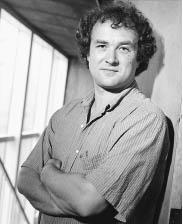Nicholas K. Tonks, Ph.D.

- Title
- Professor
- Institution
- Cold Spring Harbor Laboratory
- Address
-
Demerec Building
1 Bungtown Road - City, State, ZIP
- Cold Spring Harbor, NY 11724-2208
- Phone
- (516) 367-8846
- [email protected]
- Website
- http://www.cshl.edu/Faculty/tonks-nicholas-professor.html

- Research field
- Biochemistry; Cell Biology
- Award year
- 1991
Research
Cells respond to environmental stimuli by initiating integrated networks of signaling transduction pathways that are governed by reversible protein phosphorylation. We study this from the perspective of the Protein Tyrosine Phosphatase (PTP) superfamily of enzymes. We use a variety of experimental strategies to characterize the structure, regulation and function of members of the PTP superfamily, ultimately with the goal of defining their physiological function and establishing links to human disease. We have completed a bioinformatics analysis to define the composition and diversity of the PTP superfamily in several genomes (see our PTP web site http://ptp.cshl.edu) and are using this analysis to develop approaches to explore PTP function from the perspective of the family as a whole. We are using RNA interference and the generation of knockout mice to define the function of individual PTPs. We have developed substrate trapping mutant forms of the PTPs that are catalytically-impaired, but maintain the ability to bind and form stable complexes with substrates, allowing us to examine physiological substrate specificity. A major emphasis of the lab involves characterization of the regulation of PTP function by reversible oxidation. Reactive Oxygen Species, such as hydrogen peroxide, which are produced in response to a wide variety of physiological stimuli, may fine-tune tyrosine phosphorylation-dependent signaling by transient oxidation and inactivation of those PTPs that normally downregulate the signaling response. We have developed strategies to identify those PTPs that become oxidized in response to a physiological stimulus allowing us to establish functional links between individual PTPs and the regulation of specific signaling responses.
Scholar Keywords
1991 Search Pew Scholars
- Alison E.M. Adams, Ph.D.
- Michael A. Caudy, Ph.D.
- Lynn Cooley, Ph.D.
- Stephen J. Elledge, Ph.D.
- Daniel E. Gottschling, Ph.D.
- Thomas S. Hays, Ph.D.
- Yasushi Hiromi, Ph.D.
- Christine E. Holt, Ph.D.
- David E. Levy, Ph.D.
- Judy Lieberman, M.D., Ph.D.
- W. Ian Lipkin, M.D.
- Alfred T. Malouf, Ph.D.
- Rory M. Marks, M.B.B.S.
- Robert D. Nicholls, D. Phil.
- Janko Nikolich-Zugich, M.D., Ph.D.
- Diane M. Papazian, Ph.D.
- Helen M. Piwnica-Worms, Ph.D.
- Frank J. Rauscher III, Ph.D.
- Stephen R.J. Salton, M.D., Ph.D.
- Nicholas K. Tonks, Ph.D.